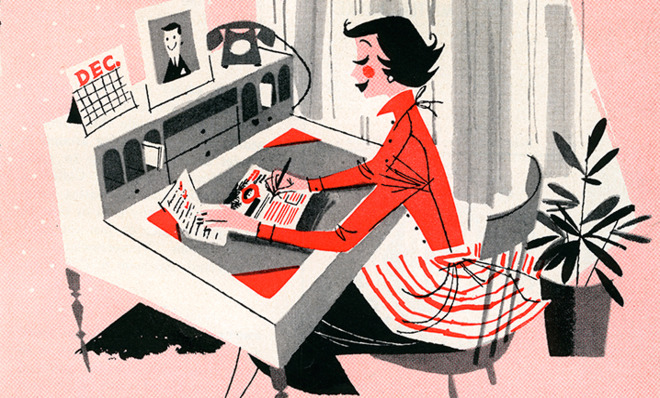How to beat marketers' Jedi mind tricks
Take a deep breath, and keep your wits about you

A free daily email with the biggest news stories of the day – and the best features from TheWeek.com
You are now subscribed
Your newsletter sign-up was successful

The advent of the holiday season also heralds the start of an all-out psychological warfare waged on shoppers by stores and advertisers. The most sure-fire way to beat the marketing mind games would be to avoid the craziness altogether, but if you must venture into the mall this season, keep these strategies in mind:
Give yourself a time-out
Whether it's from the crowds, the blaring Christmas carols, or the flashy displays, the holiday shopping experience can really get your heart rate up. And when your blood is pounding, you tend to overreact to things in ways you might regret later — as anyone who's ever argued with a significant other can attest. "The same mechanisms are in play when shopping under pressure, often with a similar result: over-purchasing and buyer's remorse," Golden Gate University psychologist Kit Yarrow writes in Psychology Today. "Whether it's the stress of crowds, time pressures, fears of missing out or physical exhaustion and thirst — we think less clearly when our heart starts racing."
The Week
Escape your echo chamber. Get the facts behind the news, plus analysis from multiple perspectives.

Sign up for The Week's Free Newsletters
From our morning news briefing to a weekly Good News Newsletter, get the best of The Week delivered directly to your inbox.
From our morning news briefing to a weekly Good News Newsletter, get the best of The Week delivered directly to your inbox.
(More from World Science Festival: Your state bird could be extinct by 2080)
Taking a few minutes to center yourself — walking away for a bit, then returning to the aisle of interest — could make the difference between a sweet deal and a regrettable impulse buy.
Make a list, check it twice
Just diving into a sale with no idea of what you want to buy is a recipe for overspending. Seeing throngs of shoppers filling their carts can naturally encourage us to jump on the bandwagon, according to University of Southern California consumer psychologist Lisa Cavanaugh. Seeing people grab a certain item can make you subconsciously think it's a great deal, or worry you're missing out on a limited supply. "It's really easy to get swept up in the craziness," Cavanaugh told LiveScience.
A free daily email with the biggest news stories of the day – and the best features from TheWeek.com
Instead, make a defined list and budget for your shopping trip. "When people set goals before committing to an activity, they do better," University of Denver marketing professor Ali Besharat told the Denver Post. "There's research that shows that when people create a shopping list before they go to a grocery store, they spend 30 percent less than people without a list."
(More from World Science Festival: The science of perfect pumpkin pies)
Don't believe your eyes
Stores position their merchandise very carefully: keeping more expensive items at eye level and bargain items lower, using "triangular balance" to draw your gaze to high-price items at the center of an arrangement of less-expensive stuff, and placing bins of little trinkets and gadgets near the checkout line to encourage impulse buys. Store layouts themselves are labyrinthine, to get you to spend more time inside and pass by more items, with IKEA probably the most masterful maze-builder, as University College London architecture professor Alan Penn outlined in a 2011 lecture.
"The most important rule as a shopper is to keep your wits about you," British merchandising consultant Karl McKeever said in an interview with The Telegraph. "If you enter a retailer's property, in one sense, you lay yourself open to any tricks or techniques that they might want to spring on you. The best armory you can have is to keep your eyes open and your ear to the ground and see what's going on."
Fear that freebie
Freebies aren't given out in the store out of the goodness of a corporation's heart; marketers know that it's a great way to hook you into spending money. Researchers Kapil Bawa and Robert Shoemaker found that something as small as a free sample of toothpaste was enough to instill brand loyalty. "Unlike other consumer promotions such as coupons, free samples can produce measurable long-term effects on sales that can be observed as much as 12 months after the promotion," Bawa and Shoemaker wrote in a paper for the journal Marketing Science. So take the fancy cheese or lotion sample, but don't feel obligated to buy.
(More from World Science Festival: How lake-effect snow (and the mysterious thundersnow) happens)
Don't handle the merchandise…
Experiments have shown that touching things makes us more likely to spend more money on them — even something as simple as handling a coffee cup for an extra 20 seconds made people bid higher on the mug. Why? Rationally, handling an object can tune you into certain attractive features of it — like the sleek way that new smartphone fits in your hand, or the exquisitely velvety lining of that expensive jacket. Irrationally, touching things makes us feel a bit like we own them, Wisconsin School of Business marketing professor Joann Peck told the Los Angeles Times, and "you'll pay more for anything you feel like you own." If you can keep your hands off, you might dip into your wallet less.
-
 Britain’s ex-Prince Andrew arrested over Epstein ties
Britain’s ex-Prince Andrew arrested over Epstein tiesSpeed Read The younger brother of King Charles III has not yet been charged
-
 Political cartoons for February 20
Political cartoons for February 20Cartoons Friday’s political cartoons include just the ice, winter games, and more
-
 Sepsis ‘breakthrough’: the world’s first targeted treatment?
Sepsis ‘breakthrough’: the world’s first targeted treatment?The Explainer New drug could reverse effects of sepsis, rather than trying to treat infection with antibiotics